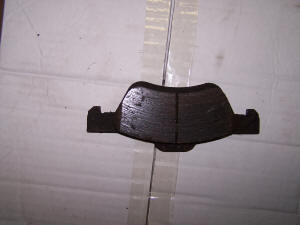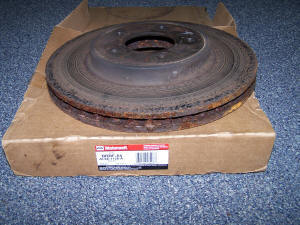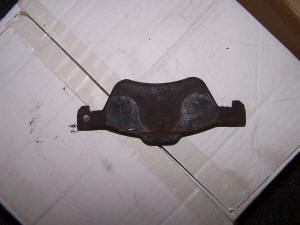Feud With Ford
We ended "yesterday" with
"What Feud With Ford?
Stay tuned. Whose side you're on will depend on how you feel about the importance of brakes."
This feud.
Brakes are Important
Although I pooh-pooh brakes in this blog and in my driving, castigating them for their ability to turn valuable gasoline and the kinetic energy it provides into useless waste heat, occasionally they are necessary. When an evil, untimed traffic light turns red with too little distance to coast, when a vehicle going slower than I am violates the Golden Richard Rule of driving*, or, more benignly, when I reach my destination, I use, as briefly as possible, my brakes. When I do, I want them to work properly. Imagine, then, my vexation and consternation when I found that my Ford Escape Hybrid had a serious brake problem.
Brakes are a "Normal Wear" Item, Right?
Yes and no. If you've been driving for decades and have had a number of cars, you'll probably remember that every 25-50,000 miles or so the service guy tells you with a poker face that you "need new brake pads." And maybe every 75-100,000 miles it's time for the rotors to be replaced or ground or shaved or straightened. That's normal wear! But if you have a hybrid such as the Prius, "normal" takes on a new meaning, such as, possibly, "never." Because the energy normally absorbed by the brakes is recovered instead by the battery, the brakes get very little workout. Yet since hybrids can encounter traffic conditions that require "panic stops," the designers cannot skimp on them as they do, for example, on the low-voltage battery. So the Prius has normal, full-sized brakes that receive almost no use. My service guy, poker faced on "cabin air filter" issues, has never uttered the word "brakes" in 107,000 miles. Exactly as it should be.
When I bought the Ford, I expected an identical experience. Same electrodynamic braking, same extremely gentle usage. And, in a sense, my expectation was fulfilled. There was no brake wear to speak of. So, when the service guy told me at less than three years (the normal warranty period) and 16,000 miles (less than half the warranty mileage) that the brake pads and brake rotors as well would have to be replaced immediately, vexation and consternation (see above) ensued. This ensuing transmogrified into indignation when further conversation indicated that the brakes didn't wear out, they rusted out! And it has now become a feud after I found that Ford not only didn't and doesn't recognize this as a safety problem but has refused to do the work under warranty or to reimburse me for the grossly premature brake "failure."
Rusted Out!
The whole (well, almost whole) point of a gas electric hybrid vehicle is that energy usually wasted in braking, i.e., by start-and-stop driving, is recovered by the battery instead. In other words, not using the brakes is normal operation. As demonstrated by my 107k-mile Prius, the brakes and brake rotors can easily go a much greater distance than in normal cars with no maintenance at all. So, one would think, Ford would have designed the brakes to withstand a lack of use rather than make them of a material that prematurely rusts. Clearly they didn't, since, if you look at the pictures, you will see very premature rust indeed. I consider this a design defect, and Ford's welching** on paying for the repair under warranty a less than honest and possibly foolish act on their part. And, just for the record, this "lack of use" is hardly comprehensive. The car got its 16,000 miles from being driven, deliberately, at least once a week and more often in winter.
Whew, that's a lot of babble. How about some photos?
 |
 |
 |
 |
Yuck.
Ford Escape RIKL REVIEW - Part 2
Although I panned the user interface and navigation display in my first RIKL Review of the Ford Escape Hybrid, I had almost nothing to say about the vehicle itself. At that time it was new and it had only been driven about 1000 miles. It has been largely trouble-free in the ensuing 15,000 miles although there was another brake problem, this time with the ABS, which was fixed under warranty. It handles pretty much as I expected an SUV to handle, the gas mileage has been reasonable, i.e., a bit less than the EPA tests promised, and despite the continual irritation of the electronics interface it has worked well until the problem recounted above. My favorite feature is the ability to set the driver and passenger temperatures separately.
But I am very discouraged by this premature brake failure. There is no excuse for it, and no excuse for it not being repaired under warranty. (The repair cost was about $1000.) Furthermore, letters to Ford received at first no response, and then, after a follow-up, a belated, negative, and unspecific denial letter that you just know was written by a committee of marketers and psychologists who wouldn't know a brake rotor if it overheated and melted a tire. You won't be shocked if the text of their letter appears in a future blog, perhaps with its own RIKL Review. Meanwhile, I shall (of course!) pursue this with the NTSB, since Ford doesn't seem to feel that premature brake deterioration is a serious matter.
* If you are moving into my lane and going faster than I am, get in front of me. If you are going more slowly, get behind me. Really, Drivers, is that so difficult?
** Or possibly "welshing." Microsoft is content with neither, so I shall assume they're both OK.


